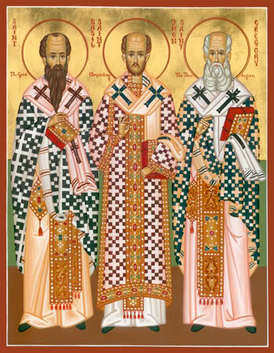Saint Basil the Great, bishop of Caesarea was one of the
most distinguished Doctors of the Church. He lived c. 329 to January 1, 379.
Theologians place Saint Basil after Saint Athanasius as a defender of the
Church against the heresies of the fourth century (the most destructive of the
faith was the Arian heresy).
Saint
Gregory of Nazianzus (c. 325-389) was also from Cappadocia and a friend of Basil, followed
the monastic way of life for some years. Eventually the Church called Nazianzus to be a priest and later bishop of Constantinople (in 381). Saint
Gregory was given the title “The Theologian” because of his learning
and oratory.
Many icons of Saints Gregory of Nazianzus and Basil include
Nazianzus’ brother Saint Gregory of Nyssa. The group is known as “The
Three Cappadocians.” Some make the claim that Basil outshines Nazianzus and
Nyssa in practical genius and actual achievement. BTW, the icon presented here does not include Nyssan but Saint John Chrysostom.
The liturgical prayer for today’s memorial may be found here.
Saint Basil the Great writes on life’s journey:
We read in the Book of
Psalms: ‘Blessed is the one who walks not in the counsel of the wicked, nor
follows in the way of sinners.’ Life has been called a ‘way’ because everything
that has been created is on the way to its end. When people are on a sea
voyage, they can sleep while they are being transported without any effort of
their own to their port of call. The ship brings them closer to their goal
without their even knowing it. So we can be transported nearer to the end of
our life without our noticing it, as time flows by unceasingly. Time passes
while you are asleep. While you are awake time passes although you may not notice.
All
of us have a race to run towards our appointed end. So we are all ‘on the way’.
This is how you should think of the ‘way’. You are a traveller in this life.
Everything goes past you and is left behind. You notice a flower on the way, or
some grass, or a stream, or something worth looking at. You enjoy it for a
moment, then pass on. Maybe you come on stones or rocks or crags or cliffs or
fences, or perhaps you meet wild beasts or reptiles or thorn bushes or some
other obstacles. You suffer briefly then escape. That is what life is like.
Pleasures
do not last but pain is not permanent either.
The ‘way’ does not belong to you
nor is the present under your control. But as step succeeds step, enjoy each
moment as it comes and then continue on your ‘way’.
Commentary
on Psalm 1, 4 (PG 29, 220)
